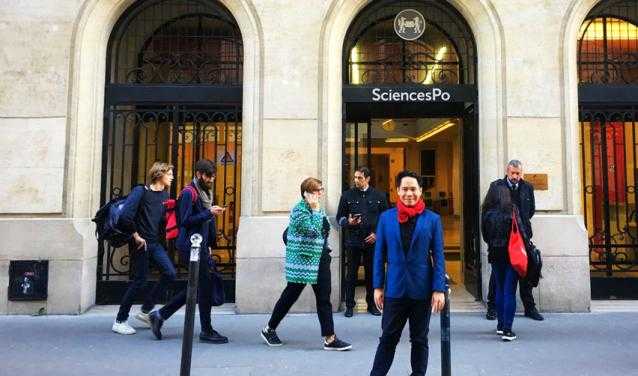Home> “Being LGBTI is not a Western influence, it’s a human reality”

06.11.2017
“Being LGBTI is not a Western influence, it’s a human reality”
In 2012, Anan Bouapha founded Proud to Be Us Laos, the country's first civil society organisation promoting equal rights for young LGBTI. In 2017, he enrolled in a one-year Master’s programme at the Sciences Po Paris School of International Affairs with the goal of acquiring the necessary skills to make his organisation into a think-tank.
In 2012, at the age of 25, you and your association Proud To Be Us Laos organised the first LGBT pride event in Laos. How did the public and the government react to this initiative?
In the local context, I would not use the term LGBT pride as it is prone to misinterpretation, particularly by the government as they think that it’s a Western ideology, especially when international governmental organisations were among our supporters.
However, building on the fact that gay men and transgender people have been taken into account in the National Strategic Plan on HIV/AIDS Prevention (Ministry of Health), the core objective was to create a public platform for all LGBTI individuals, society and related sectors to discuss LGBTI issues openly without fear.
This is a great step forward for Laos to work further with this community, and I hope not just in terms of health issues. We must recognise the Lao government for working vigorously to fight HIV/AIDS and trying to become more open to the needs of this population.
That is how the doors gradually open, so the team and I are taking advantage of this opportunity to create a more open dialogue about this issue in Lao society. Being LGBTI is not a Western influence, it’s a human reality. It’s time to talk about it not just in the context of health, but in its social, economic and political aspects.
Has recognition of the LGBT community in Laos improved since the first event five years ago?
Progress is hard to measure because there are so many components that need to be integrated in the approach to this difficult task. However, our tireless contribution and ongoing movement, as well as the positive efforts of the Lao government to understand the issue, have made the community realise that things are getting better everyday. For example, the first International Day Against Homophobia, Transphobia and Biphobia in 2015 was aired on Lao National Television—a government-owned media—and a transgender outreach worker got the opportunity to talk about her hopes as a transgender person. It was an unforgettable moment for us to see this thing appear in the national media, a highlight for the LGBTI community in Laos. Also, last May the International Day Against Homophobia and Transphobia was attended by some officials from the Lao Ministry of Foreign Affairs and the event was allowed to be aired on national television for the second time. This is the beginning of positive change.
These events could be interpreted as positive recognition from the Lao government, after all our hard work and perseverance to make the voices of the LGBTI community heard through a local approach with our government and technical support from international governments and coalitions.
You have just started the Master in Advanced Global Studies, a programme for young professionals offered by the Sciences Po Paris School of International Affairs. What are your expectations of the programme?
As I am already working, I know what I want to do for a living later. I hope that the programme will provide me with a more professional approach and give me exposure to inspiring alumni and professionals so I can polish my professional skills and build my network. I also look forward to sessions with career advisors focused on how we can improve our professional prospects after Sciences Po.
What do you plan to do after the Master’s programme?
I will get back to my LGBTI rights movement, Proud to be us Laos, with a firmer grasp of political sociology and human rights language and tools. In Laos, I will try to obtain a legal status for my organisation from my government. It would make Proud To Be Us the first civil society organisation that touches base with a key young at-risk community like LGBT. I would like to see Proud to be Us Laos become a think-tank for the government, so that we can help alleviate the difficulties that the government is currently encountering in terms of HIV/AIDS among one of the most affected populations.
Find out more